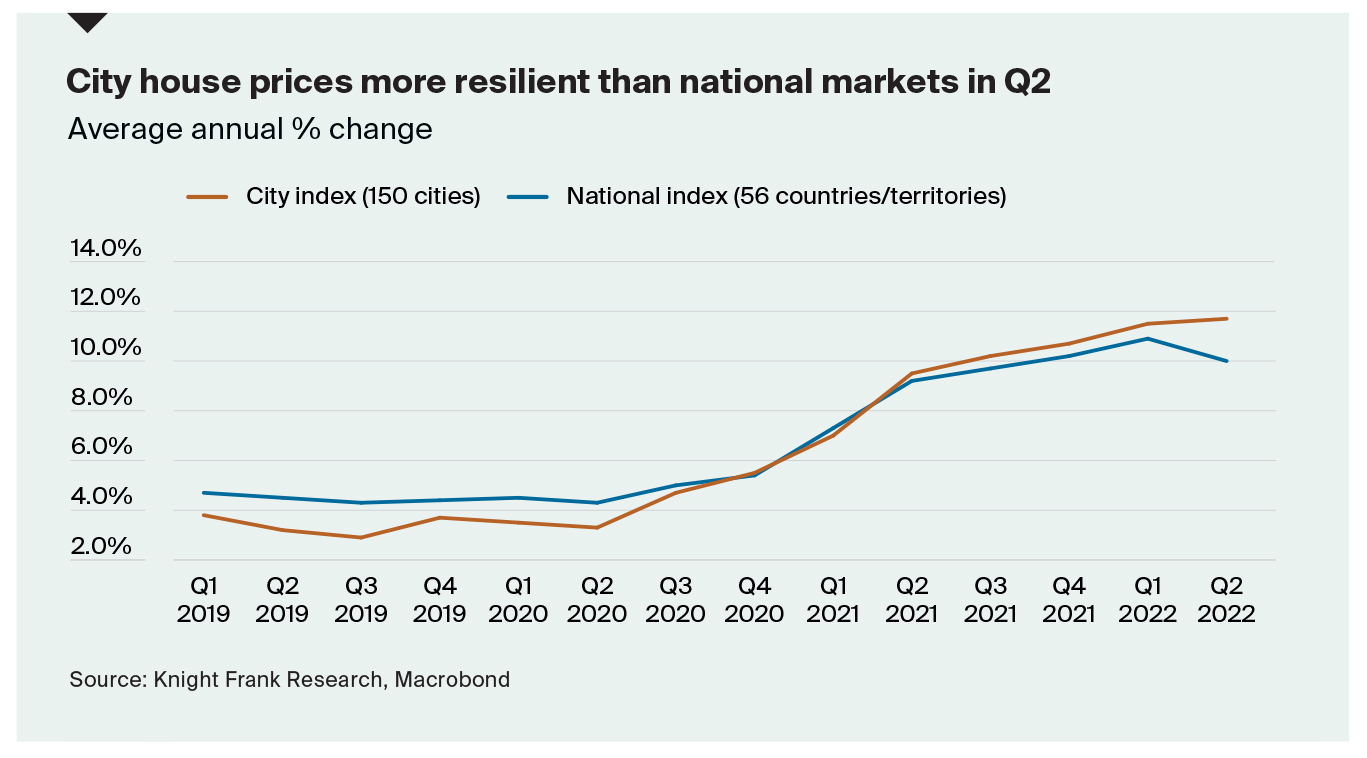Global house prices defy gravity
Plus, rent controls in Scotland and the economic implications of the Truss energy plan
4 minutes to read
Fiscal foes
Liz Truss's huge energy plan, due to be announced tomorrow, will likely bring down the peak of inflation and moderate the depth of any downturn. But the plan could raise financial risks – substantially.
That's the consensus emerging among economists, some of whom mark the plan as a "near-term game changer". Capital Economics suggests the rate of inflation could peak at 11% in October, rather than 14.5% in January as the group currently forecasts. The peak to trough fall in real GDP is likely to be closer to 0.5% rather than 1%, Neil Shearing, the group's chief economist tells the Times.
Still, monetary and fiscal policy are now pulling in different directions. Truss's energy plan will boost household spending power as the Bank of England aggressively works to dampen demand. That could prompt a more aggressive approach to rate rises, JP Morgan economist Allan Monks tells the FT. Pricing in financial markets suggest the Bank of England could as much as double the base rate by the end of the year from where it currently stands at 1.75%. There are three Monetary Policy Meetings between now and Christmas, with the next due on the 15th of September.
Markets balked at the extra borrowing. The yield on 10-year UK government debt climbed past 3% yesterday, soaring to the highest since 2011. You can read our take on Truss's appointment, and what it means for commercial and residential property here.
Headwinds
UK house prices climbed 0.4% during August, according to the Halifax house price index, out this morning. The annual rate of growth moderated slightly to 11.5%, from 11.8% the previous month. That's another resilient reading considering the circumstances. Here is Tom Bill's take:
“The supply of houses tightened over the summer as more people took a summer holiday for the first time in three years, which kept prices buoyant. We expect more properties to be listed in the coming weeks as we move from a seller’s towards a buyer’s market. Together with rising mortgage rates, this will increase downwards pressure on prices after they have appeared to defy gravity for so long.”
Indeed, headwinds are building across the board and developers of all types are approaching new projects with caution. Growth in new orders reported by construction firms is now running at its weakest level since June 2020, according to the S&P Global/CIPS UK Construction PMI, out yesterday. Construction firms scaled back their input buying for the first time since the initial wave of the pandemic, which did alleviate some pressure on supply chains.
The resilience of global house prices
It's not just UK house prices that continue to defy gravity. Our Global House Price Index rose 10% during the year through Q2, dialling back annual growth only slightly from 10.8%.
Of the 56 countries and territories we track, 51 continue to register an increase in house prices on an annual basis. Even when we look at the data over the last three months that figure only drops to 49 of the 56 markets, according to the analysis from Kate Everett-Allen. We may see the inflection point during Q3.
City house prices continue to outperform their national markets (see chart). The average house price across the 150 cities tracked by our separate Global Residential Cities Index increased by 11.7% in the year to Q2 2022, up from 11.5% last quarter. Perhaps most surprisingly, there are still 66 cities recording annual price growth in excess of 10%, up from 64 last quarter.

Rent controls
Nicola Sturgeon has announced a rent freeze for both public and private properties in Scotland.
There were few details beyond that. The plans were part of the first minister's annual Programme for Government speech, which comes at the start of each new year at Holyrood.
Rental supply in Scotland - as in many UK markets - is running at near record low levels, which has supported a period of strong rental growth. Here is Oliver Knight:
"Analysis of listings data shows there were 29% fewer homes available to rent across Scotland at the end of August than at the same point the previous year and 57% fewer homes listed for rent than at the same point pre-covid in 2019. The risk is that the policy deters new investment into the sector at a time when it's needed, and encourages some existing landlords looking to divest."
In other news...
Saudi Arabia's Vision 2030 will make it the largest construction site in history. Faisal Durrani breaks down what US$ 1.1 trillion buys you.
Elsewhere - Berkeley Group says it will only purchase land "very selectively" (company statement), China growth to average 4.5% annually this decade, according to Oxford Economics (Bloomberg), and finally, London’s super-prime market continues to outperform.